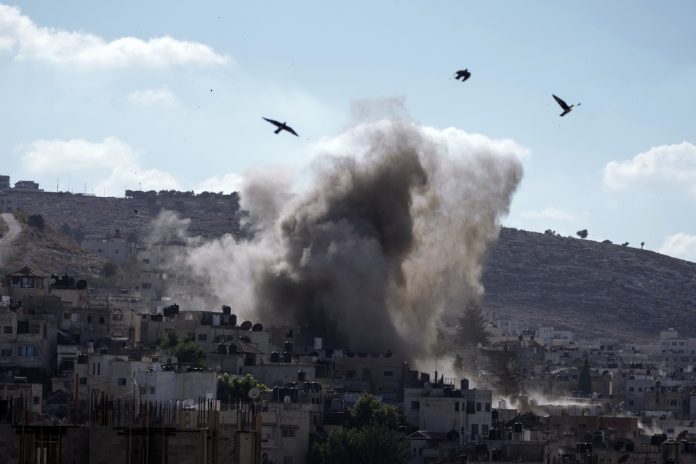JENIN REFUGEE CAMP, West Bank (AP) — Israeli forces appeared Friday to have withdrawn from the Jenin refugee camp in the occupied West Bank, after a more-than weeklong military operation that has left dozens dead and a trail of destruction.
Overnight, Israeli armored personnel carriers were seen leaving the camp from a checkpoint set up on one of the main roads, and an Associated Press reporter inside the camp saw no evidence of any remaining troops inside as dawn broke early Friday morning.
Israel’s military had no immediate comment but said it would issue a statement later in the day. It was not clear whether the apparent withdrawal was only a temporary measure to regroup forces.
Hundreds of Israeli troops have been involved for more than a week in what has been their deadliest operation in the occupied West Bank since the Israel-Hamas war began, employing what the United Nations called “lethal war-like tactics.”
Their focus has been the Jenin refugee camp, a stronghold of Palestinian militancy that has grown since the Hamas attack on Israel that started the war in Gaza nearly 11 months ago.
Fighting in Jenin accounts for 21 of 39 Palestinians who local health officials say have been killed during the Israeli push in the West Bank — most of whom, the military says, have been militants.
The fighting has had a devastating effect on Palestinian civilians living in Jenin.
Water and electric services have been cut, families have been confined to their homes and ambulances evacuating the wounded have been slowed on their way to nearby hospitals, as Israeli soldiers search for militants.
In the quiet morning Friday, Jenin residents took advantage of the lull to rummage through the rubble of destroyed buildings and take stock of the damage.
Twisted rebar protruded from the concrete of collapsed buildings, and walls still standing were pockmarked by bullets and shrapnel.
During the operation, Israeli military officials said they were targeting militants in Jenin, Tulkarem and the Al-Faraa refugee camp curb recent attacks against Israeli civilians they say have become more sophisticated and deadly.
It was not immediately clear whether they were removing troops from the other two camps as well.
The war in Gaza began when Hamas and other militants staged a surprise attack on Israel on Oct. 7, killing around 1,200 people, primarily civilians. Hamas is believed to still be holding more than 100 hostages. Israeli authorities estimate about a third are dead.
Israel’s retaliatory offensive has killed more than 40,000 Palestinians, according to the Health Ministry in Hamas-controlled Gaza, which doesn’t distinguish between civilians and combatants in its count. The ministry reports that more than 94,000 more have been wounded since the start of the war.
Israel has been under increasing pressure from the United States and other allies to reach a cease-fire deal in Gaza, but Prime Minister Benjamin Netanyahu insists on a demand that has emerged as a major sticking point in talks — continued Israeli control of the Philadelphi corridor, a narrow band along Gaza’s border with Egypt where Israel contends Hamas smuggles weapons into Gaza. Egypt and Hamas deny it.
Hamas has accused Israel of dragging out months of negotiations by issuing new demands, including for lasting Israeli control over both Philadelphi corridor and a second corridor running across Gaza.
Hamas has offered to release all hostages in return for an end to the war, the complete withdrawal of Israeli forces and the release of a large number of Palestinian prisoners, including high-profile militants — broadly the terms called for under an outline for a deal put forward by U.S. President Joe Biden in July.
___
Rising reported from Bangkok.
Source: post





